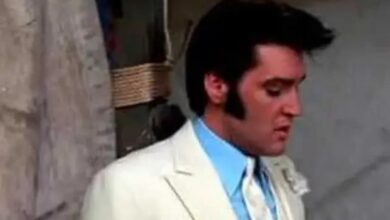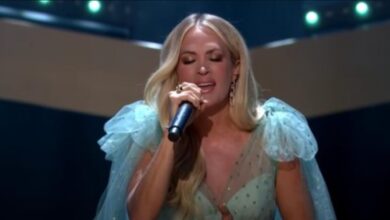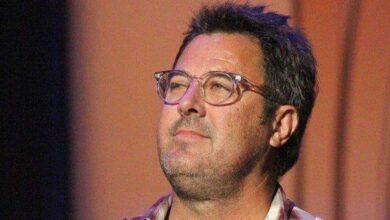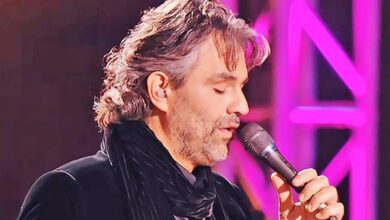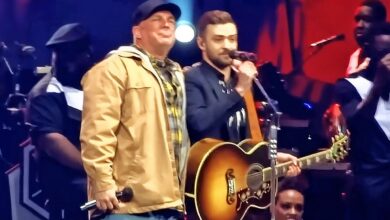Emotional Tribute: Kris, Lyle, and Emmylou’s Johnny Cash Tribute at Kennedy Center
Johnny Cash, born J.R. Cash on February 26, 1932, in Kingsland, Arkansas, was an American singer, songwriter, musician, and actor. He is widely considered one of the most influential musicians of the 20th century, with a career that spanned multiple genres including country, rock and roll, blues, gospel, and folk. Known for his deep, distinctive bass-baritone voice and his trademark all-black stage attire, Cash’s music often explored themes of love, sorrow, redemption, and the human condition.
Raised in a working-class family during the Great Depression, Cash developed a love for music early in life, inspired by the gospel songs he heard at church and the folk music traditions of the American South. He began writing songs and playing guitar as a teenager, and after a stint in the U.S. Air Force, he pursued a career in music, eventually signing with Sun Records in Memphis, Tennessee, in 1955.
Cash’s early recordings at Sun, including hits like “I Walk the Line” and “Folsom Prison Blues,” helped establish him as a rising star in the world of country music. His distinctive sound, characterized by a sparse, rhythmic style often accompanied by simple guitar chords, stood out amid the polished productions of his contemporaries.
Throughout the 1960s and 1970s, Cash continued to produce hit songs and albums, including the iconic live albums “At Folsom Prison” (1968) and “At San Quentin” (1969), which showcased his ability to connect with audiences through his powerful live performances. He also became known for his collaborations with other musicians, including his close friend Kris Kristofferson, with whom he formed the supergroup The Highwaymen alongside Willie Nelson and Waylon Jennings.
In addition to his musical career, Cash was also an outspoken advocate for social justice and civil rights. He famously recorded songs addressing issues such as poverty, prison reform, and the plight of Native Americans, earning him a reputation as a voice for the marginalized and oppressed.
Despite struggles with addiction and personal turmoil, including a period of self-imposed exile in the late 1960s, Cash continued to create music that resonated with audiences around the world. His later years were marked by a resurgence in popularity, fueled in part by collaborations with younger artists and a new generation of fans who embraced his iconic status as a cultural icon.
In 1996, Cash was honored with the Kennedy Center Honors, a prestigious recognition of his contributions to American music and culture. The tribute concert, held at the John F. Kennedy Center for the Performing Arts in Washington D.C., brought together a diverse array of musicians and performers to celebrate Cash’s enduring legacy.
The performances at the Kennedy Center Honors reflected the breadth and depth of Cash’s influence on contemporary music. Kris Kristofferson, a longtime friend and collaborator, kicked off the tribute with a soulful rendition of “Sunday Morning Coming Down,” setting the tone for an evening of heartfelt performances. Lyle Lovett brought his eclectic style to “Folsom Prison Blues,” while Emmylou Harris delivered a haunting rendition of “Ring of Fire,” a song closely associated with Cash’s late wife, June Carter Cash.
The most poignant moment of the evening came when Cash’s daughter, Rosanne Cash, took the stage to perform “Walk the Line,” a song written by her father for her mother. Rosanne’s emotional performance brought tears to the eyes of many in the audience, including Johnny Cash himself, and served as a powerful reminder of the personal connections that lie at the heart of Cash’s music.
?si=zINgGrNZ0NxZi8in
The tribute culminated in a rousing group performance of “I’ll Fly Away,” with all four performers—Kristofferson, Lovett, Harris, and Rosanne Cash—coming together to honor Cash’s legacy. The sight of these legendary musicians harmonizing on stage was a fitting tribute to Cash’s enduring influence on American music and culture.
Johnny Cash passed away on September 12, 2003, at the age of 71, but his legacy continues to resonate with music fans around the world. From his early days as a pioneering figure in rock and roll and country music to his later years as a symbol of authenticity and integrity, Cash’s impact on the world of music is truly immeasurable. As his daughter Rosanne said in her tribute at the Kennedy Center Honors, “His voice was a clarion call for the human spirit, and it rings out still.”
